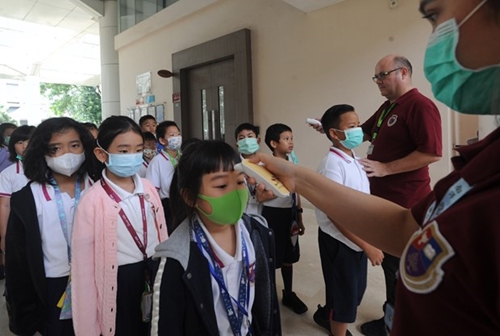Spokesman of the Indonesian Government Achmad Yurianto said COVID-19 cases there jumped to 1,155 with 109 more cases reported as of March 28 noon.
He also confirmed 15 more fatalities which raised the death toll in the country to 102, 62 of whom are in Jakarta capital city.
    |
 |
|
Students at a school in Tangerang city, Indonesia, have their body temperature taken. |
Amid the pandemic’s complex developments, Jakarta Governor Anies Baswedan decided to extend the state of emergency in the city to April 19, instead of April 5 as initially planned.
Speaking at a televised press briefing on March 28, he said with the extended state of emergency, the closure of schools and tourist destinations will also continue.
He also recommended citizens not leave their houses, except for urgent and essential matters, and observe social distancing to rein in the spread of the disease.
On March 20, the governor declared a state of emergency in Jakarta from March 23 to April 5. He urged companies to let their staff work from home to limit direct contact to avoid catching the coronavirus.
The Indonesian Government also decided to convert Wisma Atlet Kemayoran, formerly used as the Athletes’ Village for the 2018 Asian Games, into a hospital for treating 24,000 COVID-19 patients.
In Malaysia, another 159 cases of SARS-CoV-2 were recorded in 24 hours as of 1pm on March 28, bringing the number of such patients to 2,320.
The Malaysian Ministry of Health said the number of deaths from COVID-19 has reached 27 while 320 have been cured and 61 discharged from hospital after fully recovering.
Kuala Lumpur capital posted the biggest number of infection cases, followed by nearby Selangor state and the southern state of Johor.
On March 18, the Malaysian Government issued some strict rules to control the epidemic, including a ban on travel among administrative units across the country and closure of schools and restaurants. The restrictions are set to stay effective until April 14.
Source: VNA